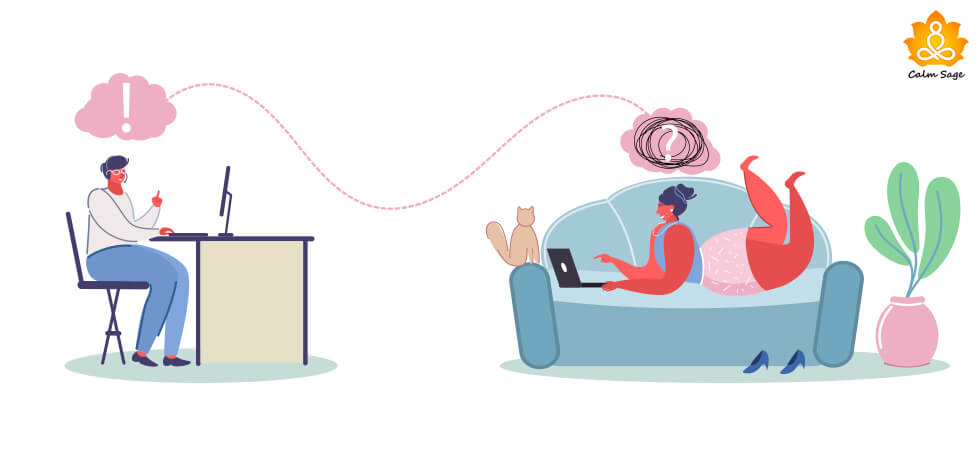Therapy Terms Everyone Needs To Know: Therapy Guide

This blog is for people who are stepping into therapy or counseling. In the beginning, you guys might hear some therapy terms which you are not aware of. This therapy guide of therapy terms will help you to understand about your therapy guidelines.
No matter what, if you are actively experiencing mental health issues or not, learning therapy terms related to psychology can empower you towards psychological wellbeing and tangible changes. Below-mentioned are some of the common therapy terms you may hear from your therapist or counselor.
| 1. Schema | 2. Psychogenic | 3. Projection | 4. Enmeshed | 5. Enable |
| 6. Empathy | 7. Dissonance | 8. Congruence | 9. Metacognition | 10. Active listening |
10 Common Therapy Terms
1. Schema
Schema is referred to the situation wherein we learn to make more sense of the things we observe in everyday lives. Schema is a Greek word which means plan or shape. Your schema towards things and stuff may change as we expand our learning and grow personally or professionally. For example: whenever we teach a toddler new things, the toddler expands his vocabulary day by day about learning more things. Psychologists use this word to teach embracement and new learning in life.
2. Psychogenic

Psychogenic is related to physical and mental wellbeing. Psychogenic is the combination of Eastern science and religion studies which are based on the concept of chakras. Psychogenic is to pay a little more attention to our physical and mental wellbeing which empowers us all and helps us to keep up with our everyday stress and anxiety. Psychogenic is not at all related to any mental health issue.
3. Projection
The projection makes its actual form when we show our concern-related attributes to someone. Specifically, projection usually occurs during personal matters, when we focus on protecting our ego. Carl Jung simplified projection by stating, “Everything that irritates us about others can lead us to an understanding of ourselves.” In order to make complete use of Carl Jung’s statement, we all have to turn our emotional intelligence whenever any negative incidence occurs in our lives.
4. Enmeshed
Enmeshed is related to a concerning problem that arises with blurred boundaries and no resolution specifically in relationships. The entangled thoughts and problems are considered as enmeshed. Enmeshed is the term that considers our inner sense and thoughts influence others. Enmeshed is often used for unhealthy and toxic relationships.
5. Enable
Enable is always used in a positive context which means empowering someone. For example, we should always enable our closed ones and loved ones to achieve their dreams. But, sometimes excessive enabling can also backfire you. Therefore, make sure you take all the responsibility for the encouragement you give to your loved ones.
6. Empathy
You may have heard the word empathy, but the application of empathy is quite different than being kind and sympathetic. People always confuse between the two terms, empathy and sympathy. Sympathy is directly associated with grief and loss. Meanwhile, empathy takes grief and loss into a next and deeper level. To learn empathy, click here.
7. Dissonance
Dissonance is directly related to congruence. Dissonance is referred to the discomfort that occurs when someone’s beliefs, thoughts, and actions do not match with you. We all strive for consistency in life and dissonance is the factor that occurs as psychological stress like anxiety, sadness, and frustration. To achieve consistency, awareness towards dissonance and congruence is essential.
8. Congruence
Mahatma Gandhi appropriately stated, “Happiness is when what you think, what you say, and what you do are in harmony.” Congruence is achieved when you exactly say what your mind or heart says when you actually speak out for your loyalty and commitment, and when you make your happiness a priority. Begin to learn congruence with your core values. Start small.
9. Metacognition
Metacognition is referred to as the awareness of one’s thoughts. Metacognition is a concept related to empowerment on the basis of thoughts. Metacognition is the recognition of not falling into negative and irrational thoughts, instead of using mindfulness to define the flow of thoughts. Metacognition can be improved with more observing your thoughts.
10. Active listening
Active listening used for the term related to actually listening to someone with a whole heart. Active listening is a different type of listening related to empathy and complete focus. For the improvement of active listening, try to not get distracted with anyone while listening to someone, and avoid the use of the phone.
I hope this blog helps you to understand therapy terms. If you know more terms related to the therapy guide, comment down below. For more such content, follow Calm Sage on all social media platforms.
Thanks for reading!























Wasn't aware of any term other than Empathy. Thankyou for this valuable information on Therapy Terms. Now I know well what to use when😊
Very well explained on Therapy Guide..
It is true that everyone may not need therapy, but there are some concepts that have universal benefits. Knowing about therapy terms come in those concepts.
A society taboo that needs to be shattered & someone needs to start it.
I really don't know about Dissonance
I think this blog is a great therapy guide. It will definitely make the therapy process smooth for both, the therapist and the client. Great work author!
Now, I understood therapy terms. Thanks